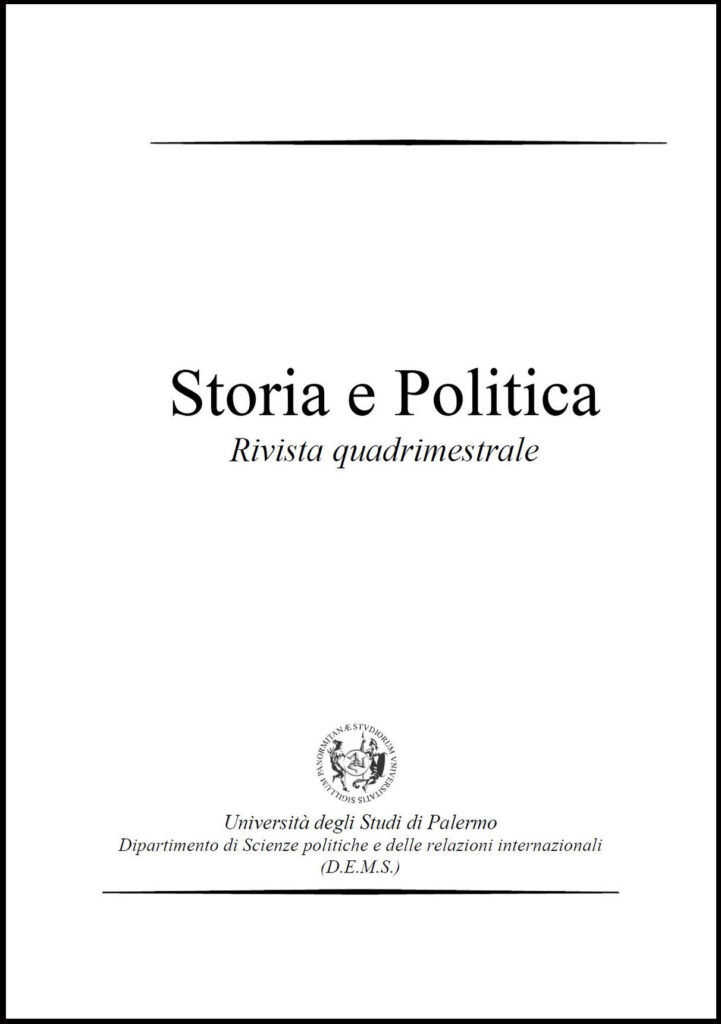Materia: Storia delle dottrine e delle istituzioni politiche
Rivista scaricabile gratuitamente fascicolo 3-2018
Storia e politica : rivista quadrimestrale : X, 3, 2018
Rosamaria Alibrandi
Università degli Studi di Messina
THE BOURBON CITY OF BROTHERLY LOVE. THE FOUNDATION OF A NEW PHILADELPHIA IN THE AGE OF ENLIGHTENMENT
Keywords: XVIII century, Enlightenment, Freemasonry, Benjamin Franklin, Gaetano Filangieri, Serrao family, Pignatelli family, Philadelphia, Filadelfia.
In 1783 earthquakes devastated Calabria, destroying many towns including Castelmonardo, a mountain village. The survivors were forced to rebuild in a more favorable location and renamed the new city Filadelfia. This essay highlights the similarities between this city and the American Philadelphia. Since intellectual élites in the Kingdom of Naples had frequent contact with American thinkers, urban planners imitated William Penn’s blueprint for the Pennsylvanian capital, evidence of the links between Masonry and the Neapolitan Enlightenment. Filadelfia became a model of rationalist urbanization and seismic reforms. The topic is intriguing from a variety of prospects, from Italian-American cultural history to the history of urban form and founded towns. Masonic thinking was important to the form of the town, and there were specifically Masonic formal and symbolic elements in the town plan. Enlightenment ideals – operative in the foundation of the American city of Philadelphia – were in play in the reconstruction of the Calabrian city of Castelmonardo as the new Filadelfia. After outlining the circumstances of the establishment of Filadelfia, the role of Freemasonry in Italy, and the influence of Italian thought in American Enlightenment thinking, the essay ends looking at the 17th century rebuilding efforts and comparing them with the 18th century ideals: where we might see Philadelphia flourishing as the home of independence from tyranny in the signing of the Constitution, and Filadelfia failing to fulfill the promise of a city of brotherly love due to the exclusion of the entire peasant class and the continuation of a suffocating feudalism.
Fabio Di Giannatale
Università degli Studi di Teramo
(RELIGION AND POLITICS IN THE THOUGHT OF MELCHIORRE GIOIA BETWEEN THE FIRST AND SECOND CISALPINE REPUBLIC (1796-1801)
Keywords: Melchiorre Gioia, Italian Risorgimento, The revolutionary Triennium (1796–1799), Cisalpine Republic.
Melchiorre Gioia was undoubtedly one of the most representative and active interpreters of Italian cultural life in the Napoleonic age for his capacity to interpret the mood of the public opinion. The essay discusses the relationship between religion and politics emerging from his writings published during the first and second Cisalpine Republic – a theme that has not been sufficiently examined by historiography. This analysis argues that Gioia’s uncertainties and antinomies can be explained through the complexity of a troubled period of Italian history, in which he was deeply involved.
Stefania Mazzone
Università degli Studi di Catania
POSITIVISMO E MEDICINA LEGALE NELLA COSTRUZIONE IDEOLOGICA DELLO STATO UNITARIO
(POSITIVISM AND LEGAL MEDICINE IN THE IDEOLOGICAL CONSTRUCTION OF THE UNITARY STATE)
Keywords: Alienists, Positivism, Administration, Mental hospitals, Nineteenth century
The essay aims to outline, through the analysis of the debate that develops within the scientific journals of alienist physicians, the relationship between the positivistic scientific conceptions as expressed in the Italy of the first years of the Unity, and the institutions of the new state. This with the specific reference to some cases of political subversion of the reference age and the consequent debate.
Robin Launay
Université de Rouen (Normandie)
(THE WORKER’S SOCIETY OF MESSINA (1860-1914): AN EXAMPLE OF THE DIFFUSION OF PROGRESSIST VALUES AFTER ITALIAN UNITY).
Keywords : Labor Movement, Worker Society, mutual aid, Messina, Risorgimento.
This essay focuses on the foundations of mutuality and solidarity through the history of the working society of Messina. It was the first in the Sicilian city facing the mainland in 1861. The port city is shared between traditions and modernity in the beginning of Italian Unity in 1860, so that workers from differents trades hang out within these society. Though this local study, it will be necessary to understand the rôle of these societies in the emancipation of workers, and in the diffusion of values. More generally, in a feeling of rejection of the southern regions in relation to the Italian Unity, it will be necessary to understand how the begining of democratics and seculars values are spreading within this class, in a place of sociability and exchange between notables and workers.
Pina Travagliante
Università degli Studi di Catania
ACHILLE LORIA: ASPETTI ECONOMICI E SOCIALI DELLA GRANDE GUERRA.
(ACHILLE LORIA: ECONOMIC AND SOCIAL ASPECTS OF THE GREAT WAR).
Keywords: Economy, Nationalism, World War, Achille Loria
In this essay the author reconstructs Italy’s dramatic transition, in May 1915, from neutrality to war, and the deep tears in the political and social context. The debate between Neutralists and Interventionists, the economic and social crisis of European society during the World War is investigated as well as reflections, analyses and interpretations of Achille Loria that uses the disease as allegory of war.
Umberto Gulli
Università degli Studi di Palermo
RAWLS ED AN-NA’IM IN DIALOGO. RECIPROCITÀ, ISLAM E COSTITUZIONALISMO
(RAWLS AND AN-NA’IM IN DIALOGUE. RECIPROCITY, ISLAM AND CONSTITUTIONALISM)
Keywords: Rawls, An-Na’Im, Islam, Constitutionalism, Reciprocity.
Constitutionalism and Islam are the theoretical framework of An-Na’im’ Islamic reformation. This proposal is possible on the hermeneutic role of the naskh for a new interpretation of the Qur’an and Sunna, based on the principle of reciprocity. Is the An-Na’im’s notion of civic reason a ‘friendly amendment’ to Rawls’idea of public reason? Making sense of the reciprocity and the reasonable as normative and moral ideal in the two thinkers, through the necessary dimension of the constitutionalism, can overcome their differences.

